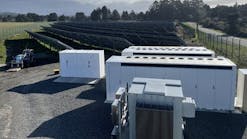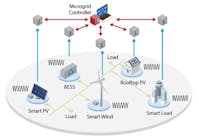The U.S. Department of Energy released a request for proposals (RFP) for up to $200 million for transmission projects to connect remote and isolated microgrids to existing infrastructure corridors in Alaska, Hawaii, and U.S. territories.
These projects are funded through the Bipartisan Infrastructure Law’s Transmission Facilitation Program, a $2.5 billion revolving fund that helps overcome financial hurdles facing new and upgraded transmission lines, according to a statement by the DOE.
One of three funding mechanisms within the program, the public private partnerships developed through this request will be designed to address the specific power grid configurations and challenges faced by residents in these remote and often isolated communities.
Strategic interconnection of existing microgrids to each other and to a larger operating transmission system will enhance grid reliability and resilience and expand access to clean, diverse, and more affordable energy to lower electricity costs in these communities.
“We are moving swiftly to deliver cleaner, more affordable energy to every American community – including our remote and isolated communities of Alaska, Hawaii, and U.S. territories, who are often hardest hit by extreme weather and increasing energy costs,” said Maria Robinson, Director, Grid Deployment Office. “Building transmission projects to connect isolated microgrids allows us to leverage energy resources and systems already in place to increase electric reliability and resilience for these at-risk communities.”
Electric consumers in Alaska, Hawaii and the U.S. territories have unique electric grid configurations, and many communities meet their electricity needs through isolated microgrids. An isolated microgrid is a group of interconnected loads, transformers, distribution lines, protective devices and distributed energy resources that acts as a single controllable power system and does not have a sustained or reliable connection to a larger-scale utility electric grid.
Leveraging public private partnerships created through the TFP, projects developed under this RFP will help build transmission infrastructure to connect microgrids to local transmission systems or interconnect microgrids to each other in order improve electric reliability.
DOE would be an equity partner in eligible projects alongside the project’s existing owners, providing both technical assistance and capital. DOE may assist projects at an early stage of project development in, for example, facilitating negotiations with relevant authorities or providing TFP funding for surveys or studies necessary for project development. For projects closer to the start of construction, DOE may, for example, assist in reviewing the terms of materials contracts necessary to achieve financial close, in addition to funding a repayable portion of the construction costs.
Funds under this program can only be used for transmission facilities that connect an isolated microgrid to an existing infrastructure corridor. Funds cannot be used to construct electric generation nor be used for distribution system facilities.
The TFP is not a grant program and proposed projects must demonstrate the ability for DOE to recover any program investment. DOE will work with applicants to develop a successful repayment method, which could include, for example, project revenues, debt financing, or replacement equity.
The deadline for applications is May 31, 2024. DOE expects to notify selected applicants in October 2024.
The Grid and Transmission Program Conductor provides more information on programs administered by DOE, as well as questions concerning the ability to pair different funding opportunities offered across DOE.


